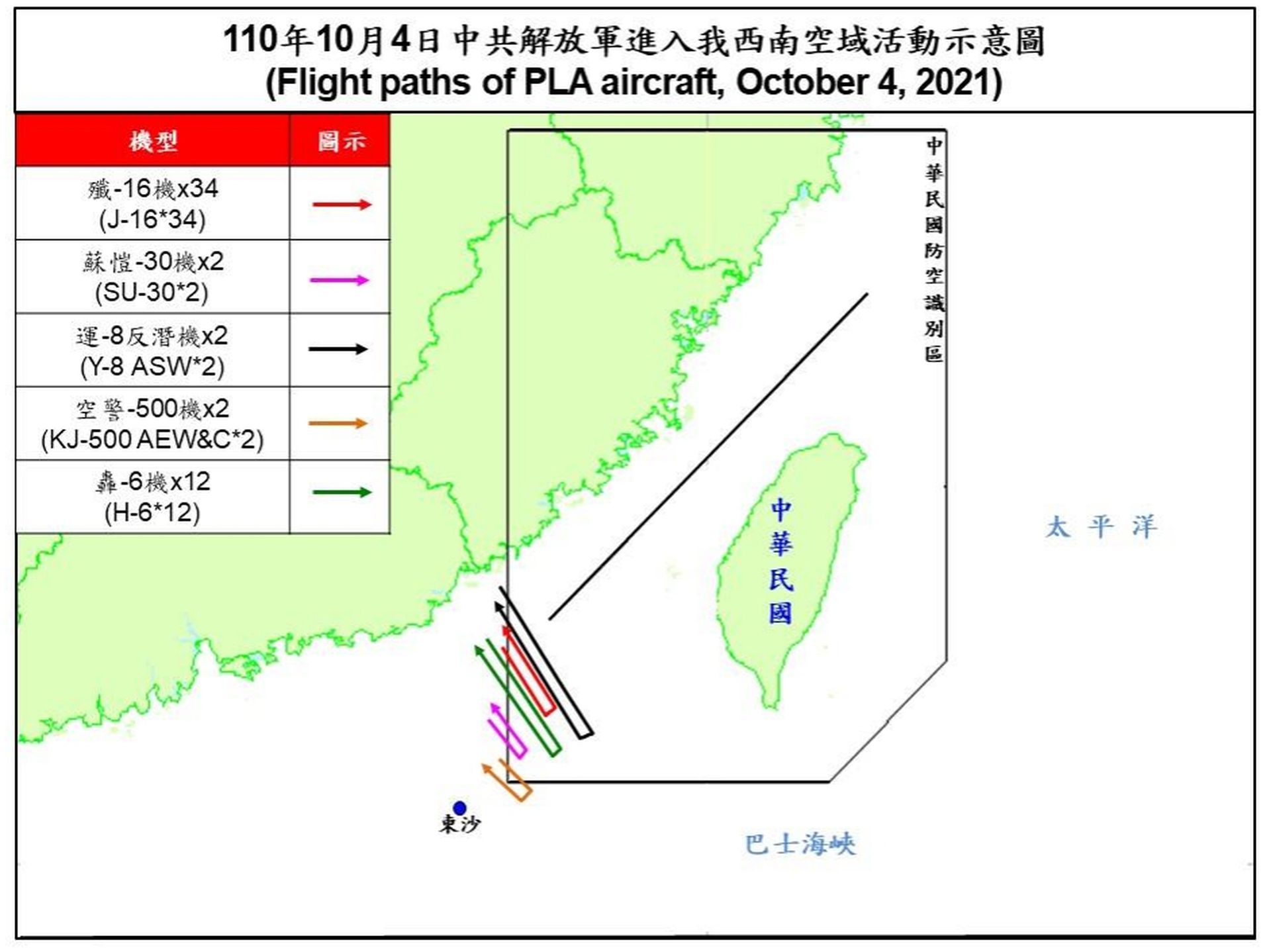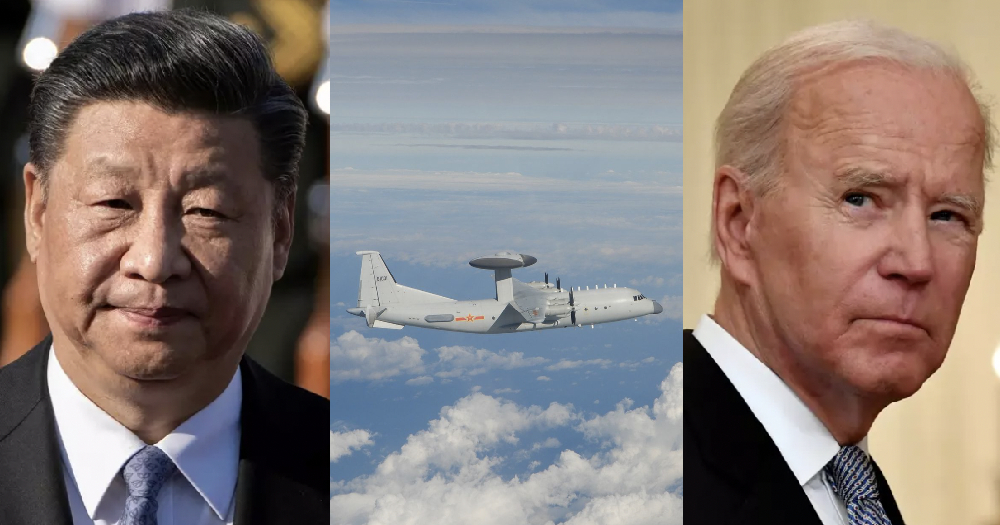Follow us on Telegram for the latest updates: https://t.me/mothershipsg
U.S. President Joe Biden said on Tuesday, Oct. 5, that he and Chinese President Xi Jinping agreed to abide by the "Taiwan agreement", Bloomberg reported.
Speaking to reporters outside the White House, Biden was responding to a question on Beijing's growing assertiveness towards Taipei.
Biden added, "And we made it clear that I don't think he should be doing anything other than abiding by the agreement."
But as there is no "Taiwan agreement" per se, some were understandably confused about the term.
U.S. and China don't share agreement on Taiwan's status
While Biden did not specify what agreement he was referring to, he was most likely referring to the U.S. "one China policy", according to Bloomberg.
Separate from the "one China principle" that Beijing subscribes to, this U.S. policy is a longstanding diplomatic understanding that Washington recognises the People's Republic of China as the "sole legal government of China".
https://twitter.com/jessicadrun/status/1445560891366207499
While China has often misinterpreted the U.S. position, Washington has never acknowledged Beijing's claims of sovereignty over Taiwan.
This is the basis for the U.S.' formal relations with China, and at the same time, unofficial relations with Taiwan.
With regards to who has sovereignty over Taiwan, the U.S. position has been consistent with its "one China policy", which is that both sides of the Taiwan Strait should mutually agree to a peaceful resolution of this issue.
So while the U.S. does not agree with Beijing's claim of sovereignty over Taiwan, it does not agree that the Republic of China is an independent state.
U.S. is deliberately and strategically ambiguous on Taiwan
Its deliberate ambiguity on the issue has often led many in the public to misunderstand its position, but is said by experts to be a great strategy to preserve peace in the region.
This is because U.S. ambiguity on its position on Taiwan can deter both sides of the strait from making any unilateral decisions that might escalate the situation.
For instance, the possibility of the U.S. coming to Taiwan's aid militarily deters Beijing from starting a war with Taiwan. Taipei is also prevented from declaring its independence as it can't guarantee that the U.S. would definitively come to its rescue in the event of war.
U.S. reiterates commitment to Taiwan
Following Biden's remark, Taiwan's Foreign Affairs Ministry reached out to officials in Taipei and Washington for clarifications, and later said on Oct. 6 that Washington had reiterated its commitment to Taiwan, Taipei Times reported.
Taiwan's foreign ministry spokesperson Joanne Ou added that the U.S. reaffirmed its position that its commitment to Taiwan is "rock solid", and that it would continue to assist Taiwan in its self-defence capabilities.
U.S. Secretary of State Antony Blinken reiterated the U.S. commitment to Taiwan as well, and raised their concerns over what they said was China's provocative military activity in the region, Reuters reported.
In a meeting with top Chinese diplomat Yang Jiechi, U.S. National Security Advisor Jake Sullivan raised several issues where they are concerned about Beijing's actions related to "human rights", such as "Xinjiang, Hong Kong, the South China Sea, and Taiwan".
In today’s meeting with Yang Jiechi, @JakeSullivan46 “raised a number of areas where we have concern with the PRC’s actions, including actions related to human rights, Xinjiang, Hong Kong, the South China Sea, and Taiwan,” according to the @WhiteHouse. pic.twitter.com/YIvXINfBEZ
— Steve Herman (@W7VOA) October 6, 2021
China set new records with largest intrusion by far
Biden's remarks following his conversation with Xi come at a time of heightened frequency of Chinese incursions into Taiwan's Air Defence Identification Zone (ADIZ) using bombers and jet fighters.
According to Taiwan's Ministry of National Defense (MND), the People's Liberation Army made a total of 149 sorties in from Oct. 1 to Oct. 4, Focus Taiwan reported, with 56 ADIZ incursions reported on Oct. 4 alone.
 Image via Taiwan's MND
Image via Taiwan's MND
This is the largest number in a single day since September 2020, when the MND began publicly releasing a tally of such incidents.
The flights involved a core of heavy bombers that were flanked by 30 or more fighter jets, which Foreign Policy pointed out that is a formation which one would expect during a real attack.
For the uninitiated, an ADIZ goes beyond a country's national airspace, and if an aircraft enters an ADIZ without warning, the country might assert its right to request the aircraft to identify itself, or scramble fighter jets to see if it poses a threat, according to the Financial Times and the New York Times.
What's the intention behind these intrusions?
The purpose of these incursions were perhaps meant to send a warning to Taiwan as the self-ruled island sees growing support internationally -- from Lithuania's welcoming of a de facto Taiwanese embassy despite Chinese opposition, to individual athletes from various countries choosing to show solidarity for their Taiwanese counterparts.
These actions also follow the arrival of 17 warships northeast of the island of Taiwan, which conducted joint military drills. The ships were from the U.S., the UK, Japan, the Netherlands, Canada and New Zealand, and were said to be a show of commitment from democracies to a "free and open Indo-Pacific".
Launched on Oct. 1, China's national day which commemorates the founding of the People's Republic of China, these manoeuvres might also be part of the Chinese military's attempt to demonstrate its loyalty to the Chinese Communist Party.
Beijing considers Taiwan to be a sensitive core issue that has no room for negotiation, and Chinese officials are also under pressure to perform for a domestic audience, and to display their objection to the slightest gesture that hints at Taiwan being a separate entity from the mainland.
Risk of miscalculation that might spark a crisis
Regardless of the intention, these intrusions have ratcheted tensions across the Taiwan Strait, with Taiwanese Defence Minister Chiu Kuo-cheng saying the situation was "the most serious" in more than 40 years since he joined the military, and that there is now a risk of "misfire" across the strait, Reuters reported.
Besides the South China Sea, Taiwan is said to be the "most dangerous flashpoint in the world for a possible war", with a risk of miscalculation potentially sparking an armed conflict.
However, experts have called for calm and opined that these manoeuvres are not necessarily a cause for alarm.
Bonnie Glaser, the director of the Asia programme at the German Marshall Fund, told Reuters that the spike in military activity is "destabilising, but not alarming" and "undoubtedly intended to intimidate Taiwan".
There might be an indication from the U.S. and China, however, to cool off tensions, with both sides agreeing in principle for their presidents to meet virtually before the year ends.
Follow and listen to our podcast here
Top image adapted via Taiwan's MND & Getty Images
If you like what you read, follow us on Facebook, Instagram, Twitter and Telegram to get the latest updates.
